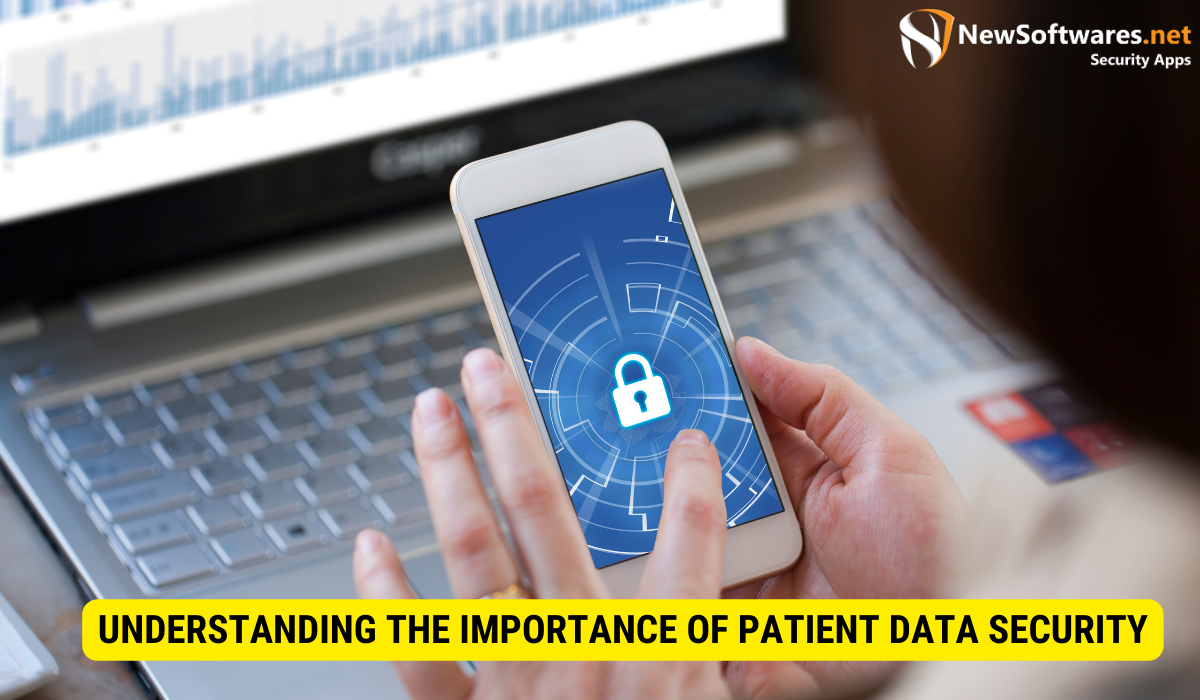Healthcare professionals play a crucial role in safeguarding patient data through data security measures, adherence to legal and ethical obligations, and effective response strategies in case of data breaches. Key challenges include technological risks and the need for comprehensive training programs. Emerging technologies like AI and blockchain hold promise for enhancing data security in healthcare. Stay updated on regulations and policies to maintain patient trust and compliance.
In today’s digital age, safeguarding patient information has become a critical priority for healthcare professionals. The importance of data security cannot be underestimated, as it ensures the privacy and confidentiality of sensitive patient data. Together, we will explore the various aspects of data security in healthcare, including the role of healthcare professionals, legal and ethical obligations, key challenges, implementing effective security measures, responding to data breaches, and the future of data security in healthcare.
Understanding the Importance of Patient Data Security

Patient data security is of supreme importance in healthcare. Every piece of patient information, from medical records to personal details, must be protected from unauthorized access and cyber threats. Patient data includes sensitive and confidential information that, if compromised, could cause important harm to individuals and healthcare organizations. It is vibrant for healthcare professionals to recognize the implications of data breaches and the potential consequences they can have on patients’ lives.
In today’s digital age, the healthcare industry has develop increasingly reliant on technology to store and manage patient information. Electronic health records have replaced traditional paper-based records, offering numerous benefits such as improved accessibility and efficiency. However, this shift has also brought about new challenges in safeguarding patient data.
The Role of Healthcare Professionals in Data Security
Healthcare professionals play a key role in safeguarding data security. They are responsible for understanding and implementing data security protocols and practices to guard patient information. This includes maintaining strong passwords, securely transmitting data, and adhering to organizational policies and procedures.
Also, healthcare professionals should be aware of the risks associated with sharing patient information and be cautious when discussing patient cases outside of a secure environment. They should also be well-versed in data security best practices and stay efficient on the latest threats and vulnerabilities in order to effectively safeguard patient information.
One important aspect of data security is the proper training of healthcare professionals. It is essential for organizations to provide complete education and training programs to ensure that all staff members are equipped with the information and skills necessary to protect patient data. This includes educating employees about the reputation of data security, teaching them how to identify and respond to potential threats, and promoting a culture of vigilance and accountability.
Legal and Ethical Obligations in Protecting Patient Information
Protecting patient information is not only a legal necessity but also an moral obligation for healthcare professionals. The Health Insurance Portability & Accountability Act sets standards for the safety and privacy of protected health information. Healthcare professionals must obey with HIPAA guidelines to safeguard the secrecy, integrity, and availability of patient data.
Additionally, health care professionals have a moral duty to uphold the trust patients have placed in them. They must respect patient privacy and confidentiality, maintaining the utmost discretion when handling patient data. Breaching patient confidentiality not only violates ethical standards but also erodes the trust patients have in the healthcare system.
Moreover, healthcare professionals must be aware of the potential consequences of data breaches. In addition to the financial costs associated with data breaches, such as legal fees and regulatory fines, there are also significant reputational risks. A data breach can dull the reputation of a health care organization, leading to a damage of patient trust and a weakening in patient volume.
It is important to note that patient data security is an ongoing process. As technology continues to evolve, so do the methods used by cybercriminals to exploit vulnerabilities. Healthcare professionals must remain vigilant and adapt their data security practices accordingly. This includes regularly updating security systems, conducting risk assessments, and implementing robust incident response plans.
In conclusion, patient data security is a critical aspect of healthcare. Healthcare professionals have a responsibility to protect patient information from unauthorized access and cyber threats. By understanding the importance of data security, adhering to legal and ethical obligations, and staying informed about the latest threats and vulnerabilities, healthcare professionals can effectively safeguard patient data and maintain the trust patients have in the healthcare system.
Key Challenges in Safeguarding Patient Information
While the importance of data security in healthcare is undeniable, healthcare professionals face several challenges in effectively safeguarding patient information. Understanding and addressing these tasks is crucial for maintaining the secrecy and safekeeping of patient data.
Technological Challenges and Solutions
Rapid advancements in technology have altered the healthcare industry. However, they have also introduced new security risks. Healthcare professionals need to ensure that their systems and networks are secure from potential cyber threats and vulnerabilities. This can be attained through regular security audits, implementing strong firewalls, and employing robust intrusion detection systems.
Moreover, the growing use of mobile devices and cloud computing in healthcare also presents security challenges. Healthcare professionals must be cautious when accessing patient information on mobile devices and utilize secure cloud storage solutions that encrypt data.
Human Error and Training Needs
Human error is additional significant factor contributing to data breaches in healthcare. Employees who lack proper training or fail to follow security protocols can unintentionally expose patient information to unauthorized individuals. Healthcare professionals must invest in comprehensive training programs that educate staff on the importance of data security, teach them to identify potential risks, and provide guidelines on how to mitigate those risks.
Regular security awareness training sessions can significantly reduce the likelihood of human error and enhance the overall data security culture within healthcare organizations.
Implementing Effective Data Security Measures
Implementing strong data security measures is vital to protect patient information from potential breaches. Healthcare professionals should adopt a multi-layered approach that encompasses various aspects of data security.
Best Practices for Data Storage and Management
Data storage and management play a crucial role in maintaining the security of patient information. Healthcare professionals should implement strong access controls, such as role-based consents, to ensure that only authorized individuals can access patient data. Regular data backups and secure disposal of outdated or unnecessary data can also help minimize the risk of data breaches.
Encoding patient data both at rest and in transit adds an additional layer of security. Encoding algorithms ensure that even if data is intercepted, it remains unreadable to unauthorized individuals.
The Role of Encryption in Data Protection
Encryption plays a vital role in protecting patient data. It transforms sensitive information into a format that can only be decrypted with the correct encryption keys. By encoding patient data both at rest and in transit, healthcare professionals can ensure its confidentiality and integrity.
Implementing robust encryption algorithms and key administration practices is crucial for maintaining strong data security. Healthcare professionals should collaborate with IT departments to select and implement appropriate encryption technologies that meet industry standards and regulatory requirements.
Responding to Data Breaches
Despite taking all necessary protections, data breaches can still occur. It is essential for healthcare professionals to have a well-defined plan in place to respond to such incidents promptly and effectively.
Steps to Take Following a Data Breach
In the event of a data breach, healthcare professionals should follow a predefined incident response plan. This includes isolating affected systems, determining the extent of the breach, and identifying the cause. Promptly notifying affected individuals and regulatory authorities is crucial to mitigate further harm and meet legal obligations.
Healthcare professionals should also conduct a thorough incident investigation to comprehend the root cause of the breach and take appropriate actions to prevent similar incidents in the future.
Preventing Future Breaches: Lessons Learned
Data breaches can provide valuable lessons for healthcare professionals. Conducting post-incident analysis can help identify vulnerabilities and weaknesses in current security measures. By learning from past incidents, healthcare professionals can strengthen their defense mechanisms and implement improved security measures to prevent future breaches.
The Future of Data Security in Healthcare

The landscape of data security in healthcare is continually evolving. Several factors will shape the future of data security and influence how healthcare professionals protect patient information.
Emerging Technologies and Their Implications
Emerging technologies, like artificial intelligence and blockchain, hold promise for enhancing data security in healthcare. AI algorithms can analyze vast amounts of data to identify suspicious activities and potential security breaches. Blockchain technology, with its decentralized and tamper-resistant nature, can provide secure data storage and facilitate secure sharing of patient information.
Healthcare professionals should stay informed about these emerging technologies, explore their potential applications, and ensure that the necessary security measures are in place before adopting them.
Policy Changes and Their Impact on Data Security
Policy changes, both at the national and organizational levels, can significantly impact data security in healthcare. Healthcare professionals must stay updated on the evolving regulatory landscape and adapt their security practices accordingly. Compliance with regulations such as GDPR and the California Consumer Privacy Act is essential to avoid legal repercussions and maintain patients’ trust.
Additionally, healthcare organizations should establish clear data security policies and actions that align with regulatory requirements and disseminate them effectively among healthcare professionals.
Key Takeaways
- Patient data security is of paramount importance in healthcare, safeguarding sensitive information from unauthorized access and cyber threats.
- Healthcare professionals have a vital role in data security, including implementing protocols, adhering to ethical obligations, and staying updated on threats.
- Challenges in data security include technological risks, human error, and the need for comprehensive training programs.
- Data security measures should include best practices for storage and management, as well as encryption of patient data.
- In the event of a data breach, healthcare professionals should have an incident response plan in place to minimize harm and prevent future breaches.
FAQs
What is the role of healthcare professionals in data security?
Healthcare professionals are responsible for implementing data security protocols, maintaining secure practices, and staying updated on threats.
How can healthcare professionals prevent data breaches?
Healthcare professionals can prevent data breaches by implementing best practices for data storage and management, encrypting patient data, and investing in proper training programs.
What should healthcare professionals do in the event of a data breach?
In the event of a data breach, healthcare professionals should follow an incident response plan, notify affected individuals, and conduct a thorough investigation to prevent future breaches.
What are the implications of emerging technologies on data security in healthcare?
Emerging technologies like artificial intelligence and blockchain hold promise for enhancing data security by providing advanced analysis and secure data storage and sharing.
How can healthcare professionals stay updated on data security regulations?
Healthcare professionals should stay informed about regulatory changes, comply with data security regulations, and establish clear policies and procedures within the organization.
Conclusion
Safeguarding patient information is a critical responsibility for healthcare professionals. It requires understanding the importance of data security, fulfilling legal and ethical obligations, addressing key challenges, implementing effective security measures, and responding promptly to data breaches. By taking preventive steps to protect patient data, healthcare professionals can ensure the privacy, confidentiality, and trust of their patients, while contributing to a more secure healthcare system as a whole.
